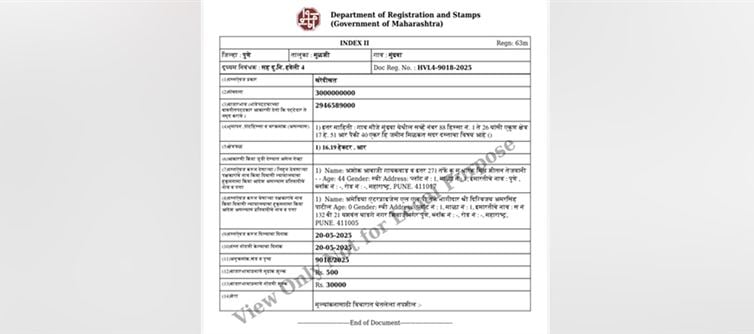
A Deal That Exposes the Divide
In the leafy environs of Mundhwa, pune, a land deal worth ₹300 crore was quietly registered. The prevailing stamp duty on such a deal would have been around ₹21 crore — by all rights, the state’s revenue. But instead, what got paid was a nominal ₹3,500. And when you ask “why?”, the questions multiply faster than the explanations. Was it simply because the buyer happens to be Parth Pawar, the son of Ajit Pawar, the deputy chief minister of the state? When a modest flat-buyer pays lakhs, shouldn’t someone buying crores pay crores? The astonishing gap throws into relief a system built not on equality or fairness but on connections, opacity, and special treatment.
🏦 1. The Maths of the Discrepancy
Let’s do the arithmetic: a deal for₹300 crore. Standard stamp duty rates in maharashtra for such high-value urban land hover around 6%–7% in places like Pune. That should place the duty in the region of ~₹18-21 crore. Instead: ₹3,500. That’s not a rounding error — it’s an aberration. For ordinary citizens buying small flats, the duty is paid, recorded, and visible. For this? Invisible. Unexplained. In effect, the elite pay a fraction while the public pays full price.
💼 2. The Rule Book and Its Exceptions
The law in maharashtra (via the maharashtra Stamp Act, 1958) clearly sets higher stamp duty rates for urban land transactions. There are legitimate reductions and exemptions for redevelopment projects, industrial consolidation, and slum-rehabilitation schemes. But none of the publicly available documents explain why this ₹300 crore deal qualified for what is effectively a near-total waiver. No published explanation for the ₹3,500 figure. No transparency on the “category” or “scheme” under which it was classified. That absence is the red flag.
🎭 3. One Rule for the Powerful, Another for the Public
Compare: an average citizen buys a flat in pune for say ₹50 lakh. They pay stamp duty at the prescribed rate, registration fee, and their payment goes on record. Meanwhile, a land purchase at ₹300 crore, and the duty paid drops to a negligible fraction. When the system allows such disparity, the message is clear: if you’re powerful or well-connected, you play by your own rule-book. The rest of us pay by the posted rates and assume our money is being collected for fair public purposes. But what does that even mean if the rich bypass the system?
🔓 4. The Transparency Deficit
In any just system, exceptions are permitted — but they are also explained, documented, and justified. Here, we have the registration document naming Parth Pawar as the buyer; we apparently have the nominal stamp duty noted. What we do not have: the publicly available justification for how the deal was slotted into a category warranting ₹3,500 instead of crores. No audit trail. No published rationale. No explanation. And when the citizen sees that absence, trust evaporates. If rules matter, they must apply equally. The mere hint of selective application destroys faith.
🧱 5. Why It Matters — It’s Not Just About Money
This isn’t merely about the ₹21 crore the state may have lost. It’s about what it signals: the system tolerates two parallel realities — one for the average taxpayer, one for the elite. When citizens pay full duty, full tax, full compliance, and yet see neither fairness nor real public infrastructure, the social contract fractures. If some pay next to nothing with no public reason, while others carry the burden unsighted, what becomes of “government for all”? What becomes of accountability? What becomes of the rule of law?
✊ 6. The Demand: No More shadow Deals
We must pivot from outrage to action. It is not enough to say “they did this” — we must demand:
Full disclosure of any exemption or reduction applied in this case.
Explanation of the category under which the duty was reduced.
Audit of all similar high-value transactions for compliance with stamp duty norms.
Systemic reform so that the duty payable is strictly linked to value, with minimal discretionary escape.
Because when the rule-book is hidden and the rich vanish from its pages, democracy becomes theatre and justice a mirage.
⚡ EPILOGUE: The Bill Comes Due
Every time the powerful pay less, the rest pay more — either in money or in shattered faith. The ₹300 crore land deal in Mundhwa is not just about an anomaly. It’s about the growing chasm between the lofty ideals of equality before the law and the lived reality of selective enforcement. If this gap continues to widen unchecked, we will not just lose revenue — we will lose trust. And once trust is gone, the scaffold of our civic life starts to crumble.




 click and follow Indiaherald WhatsApp channel
click and follow Indiaherald WhatsApp channel